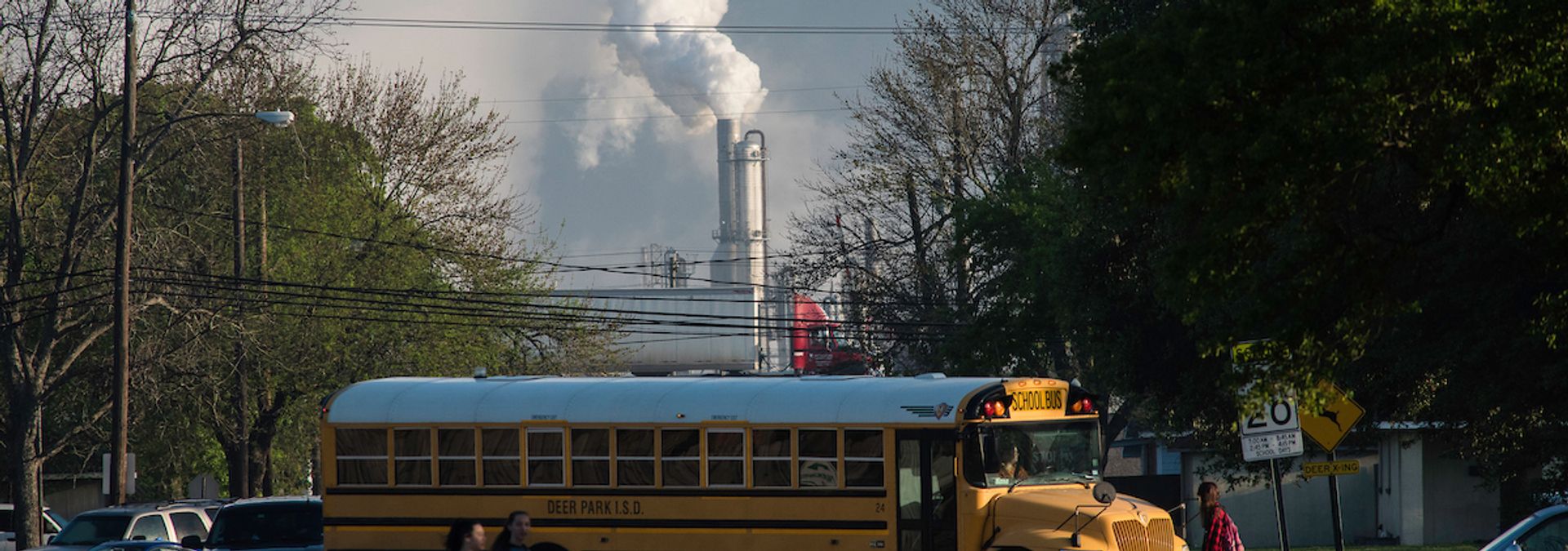
What TCEQ can change to protect the health of all Texans
It will cost TCEQ nothing to reevaluate its mission, so that environmental justice is central to its work. Photo: Garth Lenz.
Texas could be facing an anticipated $11.6 billion shortfall in the next state budget due to the coronavirus pandemic, Texas Tribune reported at the end of July.
For the Texas Commission on Environmental Quality (TCEQ), the agency charged with ensuring the quality of the air and other natural resources in one of the states with the greatest pollution-related health issues in the country, it’s time to reexamine its budget, so every decision works for every Texan.
In TCEQ’s most recent budget, for example, the agency prioritized and received funds for 10 full-time employee positions to improve the processing times of permits. That helps get refineries and other potentially hazardous facilities up and running, but it doesn’t allow for environmental protection from the pollution produced by these facilities — especially for those who bear the highest burden of pollution.
While these new refineries, concrete batch plants, factories, warehouses, incinerators, salvage yards and other polluters are evaluated individually, they collectively far exceed health-based standards. That has a real impact. “Texas’ lax environmental regulation disproportionately hurts environmental justice communities,” says Ilan Levin, associate director of Environmental Integrity Project.
Now, as TCEQ confronts the need to reevaluate its spending and its revenue, the agency could help those communities and become a stronger force for all Texans. Here are five doable adjustments that could save the agency money, reduce pollution and make a big difference in the lives of those Texans who need it most.
1. Look at the context of existing pollution when approving new permits
Air Alliance Houston Executive Director Bakeyah Nelson points out the lack of the consideration of context when TCEQ issues permits in heavily polluted areas.
If a concrete batch plant requests a new permit, Nelson says as an example, TCEQ should consider not only the pollution the plant will generate itself, but the current levels of pollution already around the proposed site and the pollution that will be generated by the heavy trucks coming through the neighborhood day and night, idling as they wait to load and unload, often early in the morning.
Adrian Shelley, director at the Texas office of Public Citizen, wonders why TCEQ doesn’t grant permits to companies who seek to surpass what the state’s current environmental standards allow. Intending to pollute less shouldn’t be punished, he says.
2. Start monitoring, inspecting facilities and taking enforcement actions before harmful pollution happens
Texans living in harm’s way of polluters should not also bear the burden of being the only ones who are alerting the state about potential violations.
Nelson and Shelley both advocate for unprompted monitoring for air, water and land quality in areas with prior violations and inspections without warning the company, continuous monitoring requirements for toxic pollutants like benzene and ethylene oxide and mobile monitoring teams that can track toxins released during natural disasters.
TCEQ could prioritize resources here, away from expedited permitting. Levin would like to see TCEQ adopt rules under its current authority to automatically trigger penalties for emission events in environmental justice communities.
The enforcement penalties that ensue then could be more costly to polluters, and penalty revenues could come back to TCEQ for continued protection of Texans, rather than solely to the state’s general fund.
3. Recommit to thorough, wide-ranging community communications
TCEQ’s current process of community engagement requires only minimal signage at the site of a potentially hazardous facility and legal fine print published in a local newspaper. “It is the bare minimum,” Nelson says. “Communities are at a total disadvantage.”
Instead, TCEQ should require companies requesting or receiving permits to individually contact by mail all residences and businesses within a five-mile radius of the plant or facility, in multiple languages, depending on the demographics of that community.
Additionally, the number of requests necessary to hold a public meeting should be made public for each site. Currently, TCEQ does not make it clear how it determines whether a public meeting request will be granted; it’s at TCEQ’s discretion, and that needs to change, Nelson says.
Overall, communication with potentially affected communities should be widespread, sent to individual addresses, with mailed follow-ups on public meetings. Nelson says, “The burden should be on the company.”
The associated costs? Those can become part of the permits.
4. Return to collaborating more effectively with local and federal agencies
TCEQ is legally able to partner with city, county and national environmental agencies and pollution control to coordinate monitoring, inspections and enforcement. But TCEQ’s connections with the City of Houston and Harris County have foundered in recent years, Shelley says.
During the Trump administration and under the influence of chief toxicologist Michael Honeycutt, TCEQ has been meeting with industry and influencing federal policy when it comes to assessing cancer risks from toxins like ethylene oxide, undermining safeguards even as cancer clusters have been discovered in Houston.
Collaborating better across these agencies while sharing data and other available resources, like mobile air monitors, would lead to better coverage, create financial efficiencies and speed up response times. Right now, TCEQ’s three mobile monitoring units are parked in Austin, at least three hours away from the Houston region, where six chemical disasters raged in the last year alone.
5. Reevaluate its mission to include environmental justice
It will cost TCEQ nothing to reevaluate its mission and amend it, even through a legislative act, so that environmental justice is central to its work.
No other state environmental agency includes economic development in its mission, as TCEQ’s does, and Texans know that that development tends to come at the expense of the health of communities of color and low wealth.
A shift in the agency’s mission would be a demonstration that it resolves to be part of a fair and just society for all Texans. With refreshed collaborative partnerships with other agencies, a reconsidered permitting processes and a renewed stance to be proactive, not reactive, when it comes to community engagement, inspections, monitoring and enforcement, TCEQ could uphold this shift in its mission without adding significantly to its budget. This shift would make a difference for the Texans who have been sacrificed by the policies and practices of the past.
Going forward, Texas must be more resourceful about how it spends its money and what its priorities are. Most Texans now believe that the state should do more ahead of time to improve health, long before a trip to the hospital becomes necessary. It’s time for TCEQ to get there, too.
Ludwin is a writer and editor in Houston.
STAY UP TO DATE
The quality of our newsletter is considered satisfactory and poses little or no risk.
SUBSCRIBE

